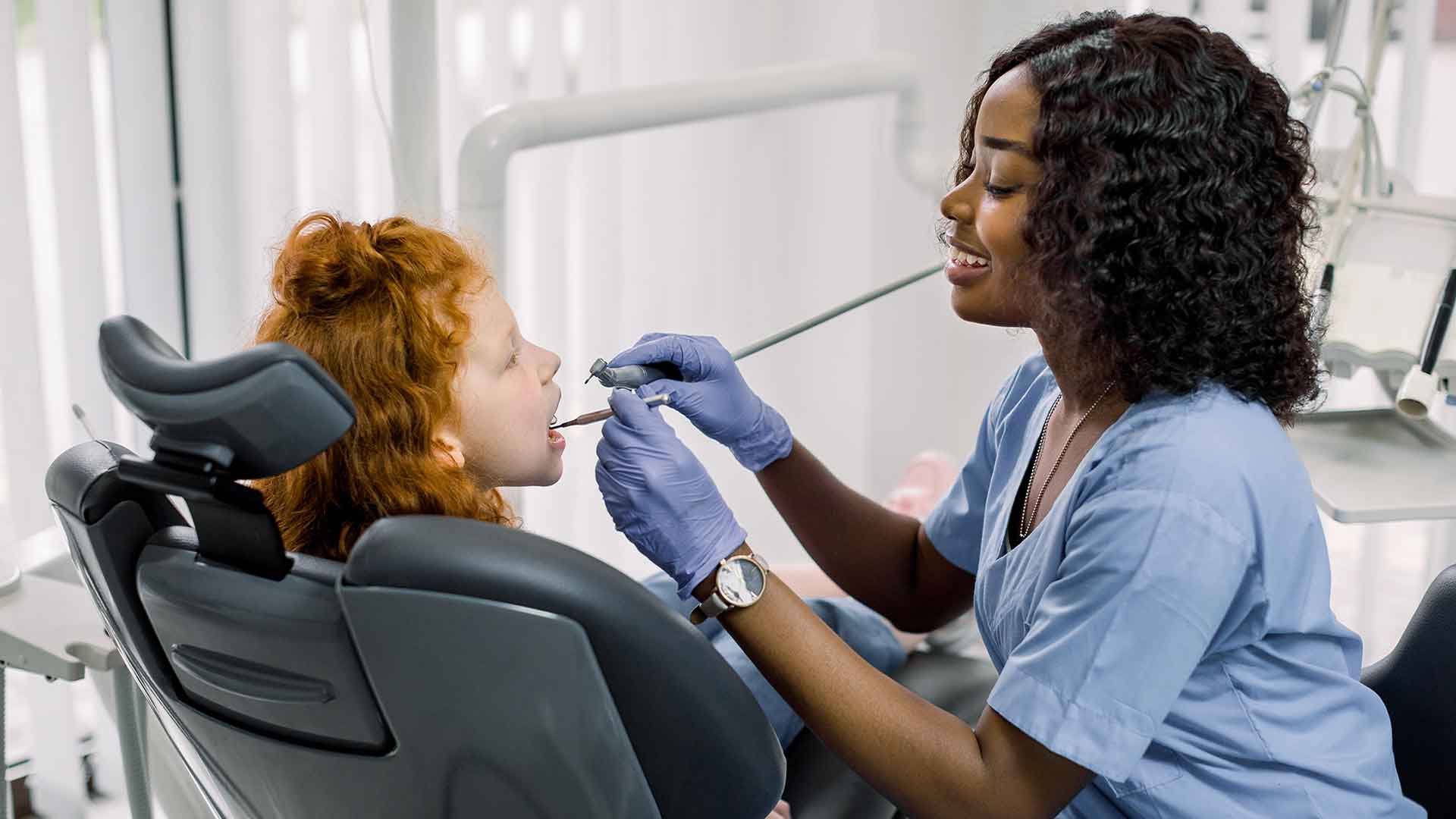
Online dental assisting certificate programs
Table of Contents
What to expect | Certificate vs. certification | Career paths | Tips for success |
How to choose a program | Resources | FAQ
Dental assistants are essential to the daily operations of dental offices. From sterilizing equipment to taking patient X-rays, dental assistants work with patients directly and behind the scenes to help keep the office running smoothly. With faster-than-average job growth projections and relatively few education requirements, working as a dental assistant can be a great first step towards other dental careers or a lifetime career all on its own.
Can you become a dental assistant online?
The requirements to become a dental assistant can vary depending on where you live, however. Some states require dental assistants to be certified, while on-the-job training can suffice in other places. No matter what’s required, getting a formal education through a dental assisting certificate program can be a boon to your career and make you a more attractive job candidate. What’s more, earning your education online can make it even easier to start your dental career today.
Are you ready to find your new college program?
What to expect from an online dental assisting certificate
Although every program has its own unique curricular structure, you can expect most online dental assisting certificate programs to include classes such as:
- Introduction to dental assisting
- Preventative dentistry
- Chairside procedures
- Dental radiography
- Dental office administration
- Dental sciences
- Clinical externship/internship
One major difference between online and in-person programs—besides the obvious difference in delivery format—is that in-person programs usually also include hands-on lab classes, whereas online programs do not (unless they are a hybrid learning program).
Even so, most dental assisting certificate programs offered online still include an in-person internship or externship that allows the student to work in a real dental office and apply what they’ve learned through hands-on practice. This might begin primarily through observation before eventually trying the work yourself.
This is an important component of any dental assistant’s education since online studies can only expand your knowledge and skills up to a certain point. Without some real practice with real patients, you may not be as prepared to work in a real dental office.
Dental assisting certificate vs. certification
While a certificate and a certification may seem like the same thing, it’s important to understand that these two terms are unique and have very different definitions. A certificate is awarded by an academic institution for completing college coursework on a specific topic, usually for a specific career (e.g. dental assisting). They typically take about a year to complete and although they involve taking college classes, they are not formal degrees (such as an associate degree).
Certifications, on the other hand, are credentials awarded by professional organizations to signify that an individual has certain knowledge and skills. Most certifications require that you take and pass an exam, but only if you are eligible. In many cases, you need a combination of relevant education and experience in the field to be eligible for these exams.
The Dental Assisting National Board (DANB) is the national certifying body for dental assistants. They offer several dental assisting certifications, but the Certified Dental Assistant (CDA) is their primary credential. To sit for the CDA exam, you must satisfy eligibility in one of the following ways:
Pathway #1: Graduate from a dental assisting or hygiene program accredited by the Commission on Dental Accreditation (CODA) OR hold a Registered Dental Hygienist (RDH) license.
Pathway #2: Have a minimum of 3,500 hours of dental assisting work experience over the past two to four years.
The DANB also has a third pathway for former CDAs or other dental professionals.
Dental assistant career paths
A dental assisting certificate naturally prepares students to work as dental assistants in most standard dental offices, but there are several other career options that graduates of a dental assisting program may consider:
How to succeed in an online dental assisting certificate program
Online learning can be a drastically different experience than the traditional college classroom. If you’re thinking about enrolling in an online dental assisting certificate program, consider some of these helpful tips to set yourself up for success.
Create a consistent study routine
Online courses may be delivered in one of two ways: synchronously or asynchronously. Synchronous courses require you to log in at a certain time and participate in a live class, not much differently than you would for an in-person class. Asynchronous courses have the student complete the course content on their own time and do not have a live component. Online dental assistant programs may have one or both types of courses.
Either way, online students should create and stick to a study schedule to keep on top of their classes. This is especially important for asynchronous courses that lack the same consistent structure that synchronous courses provide. If you don’t carve out time for your assignments, you could risk falling behind and being unprepared for any tests or exams.
Practice professionalism for any internships or externships
If you get the chance to work in a dental office through an internship class, you should treat this opportunity as you would any real job. Execute professionalism at every opportunity: be on time, ask questions, be open to constructive feedback and treat your coworkers with respect. After all, a dental office that you intern for may even be open to offering a job after you graduate or writing you a letter of recommendation if they enjoy working with you enough.
Know where to get help if you need it
If you find yourself struggling in your courses, don’t hesitate to seek assistance. Community and technical colleges—where you’ll find most dental assistant certificate programs—usually have academic support services available to their students. Many also have additional support services for certain groups such as disabled students or veterans.
Consider joining a professional organization
Professional membership organizations such as the American Dental Assistants Association (ADAA) provide numerous benefits to their members, including free continuing education courses, scholarships, career resources and more. These kinds of associations typically have a discounted student-level membership for dental assistant students. Joining an organization could be a great way to find community within the field and receive some useful perks.
How to choose the right CDA program for you
If you’re feeling a little overwhelmed by all the dental assisting certificate programs that are out there, start narrowing down your search by considering some of these important factors:
- Curriculum and experiential learning opportunities: Take a close look at each program’s curriculum to make sure you feel confident that their courses can provide you with the knowledge and skills needed to succeed. Even for online programs, you should find out if they include some sort of clinical internship and/or in-person labs. These kinds of experiential learning opportunities are invaluable in getting hands-on experience practicing what you’ve learned in the classroom. Without at least some in-person component, you may not be as prepared to hit the ground running once you land a job.
- Consider accreditation: Accreditation may not be as important to some people as it is to others, and this can partially depend on any dental assistant requirements set forth by your state. Programs accredited by the Commission on Dental Accreditation (CODA) can make it easier to obtain certification through the DANB, which is required in some places. CODA-accredited programs may also garner more recognition from potential employers. However, you can also get certified through the DANB with enough hours of experience regardless of your educational background, so it may not be necessary.
- Cost-effectiveness: You must understand your budget as you start searching for dental assistant programs. Program costs can vary widely, but most tend to fall in the $3,000 to $10,000 range. Don’t forget to explore financial aid options like scholarships and loans, which may be obtained through multiple sources such as the FAFSA, the school you are attending or independent providers.
Browse our vetted online dental assisting school programs
All Online Schools is an advertising-supported site. Featured or trusted partner programs and all school search finder, or match results are for schools that compensate us. This compensation does not influence our resource guides, or other editorially-independent information published on this site.
Resources for virtual dental assistant students
Whether you are a current or future dental assistant, these resources may be useful throughout your dental education and career advancement:
- The Dental Assisting National Board (DANB) offers multiple certifications for dental assistants, including their Certified Dental Assistant (CDA) credential. The DANB also has numerous career resources available for dental assistants.
- Nearly a century old, the American Dental Assistants Association (ADAA) is the nation’s oldest and largest membership organization for dental assistants. The ADAA also publishes “The Dental Assistant,” a bimonthly professional journal.
- The Commission on Dental Accreditation (CODA) is responsible for accrediting dental and allied dental education programs.
- The National Dental Assistant Association (NDAA) is an auxiliary of the National Dental Association, comprised of dental assistants as well as dental office managers, receptionists, treatment and clinical coordinators and any other dental office personnel besides dentists and hygienists.
Parting words
Although some states require dental assistants to graduate from a dental assisting education program, many others do not have these requirements. Becoming a dental assistant, therefore, may simply be accomplished through enough on-the-job training.
However, attending an education program could do wonders for a dental assistant’s career, regardless of what their state requires. Certificate programs are a great option since they take less time to complete than a degree, usually cost less, have relatively few admissions requirements and still teach you exactly what you need to know to get started as a dental assistant in most places. Many dental assisting certificate programs are offered online, which could make completing your education even easier. Keep in mind that most online programs still do require an in-person internship or other clinical experience, which is a good thing—after all, it’s important to get some hands-on practice working with real patients so that you feel comfortable performing your dental assisting duties from the outset.
Frequently asked questions (FAQ)
What are the licensing and certification requirements for dental assistants?
Requirements for dental assistants vary by state. Some states require dental assistants to be licensed or registered, while others do not. Of those that require dental assistants to be licensed or registered to practice, some require graduation from an approved education program (such as a certificate or an online associate degree). Other states allow dental assistants to obtain a license or registration simply by applying and answering some personal data questions, and do not have any formal education or experience requirements.
Can I get a dental assisting certificate entirely online?
Yes, some institutions offer dental assisting certificates that are entirely online. However, even most online programs do include an in-person component, usually through a clinical internship. Although there are some programs that do not include any in-person experiences, graduates might not be as prepared to work in a real dental office without any hands-on practice.
How long does it take to finish an online dental assisting certificate?
Dental assisting certificate program lengths can vary, but most programs take approximately nine to 12 months to complete.
What is the salary and job outlook like for dental assistants?
According to the 2023 Occupational Employment and Wage Statistics from the BLS, the median annual salary for dental assistants is , with the bottom 10% earning and the top 10% earning . Factors such as your education, experience and location can all play a role in how much you can earn as a dental assistant.
The job outlook for dental assistants is quite bright, with the BLS estimating that the employment of dental assistants will grow through 2032, faster than average across all occupations.

Are you ready for a new adventure?
Find your new school today!
All Online Schools is an advertising-supported site. Featured or trusted partner programs and all school search finder, or match results are for schools that compensate us. This compensation does not influence our resource guides, or other editorially-independent information published on this site.


All Online Schools is an advertising-supported site. Featured or trusted partner programs and all school search finder, or match results are for schools that compensate us. This compensation does not influence our resource guides, or other editorially-independent information published on this site.